Performing Arts
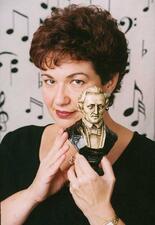
Astrith Baltsan
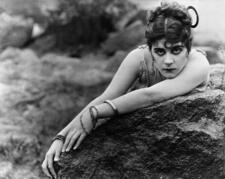
Theda Bara
Theda Bara was a film icon of sensuality and the exotic for generations. Bara’s magnetic performance in her debut film A Fool There Was made her an overnight success, and between 1915 and 1919 she starred in over forty films. Unfortunately, Bara’s dark exoticism was short-lived and she was passed over in favor of more “wholesome” starlets, but she remains a cinematic icon.
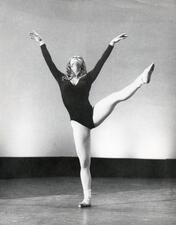
Cecilia Baram
Cecilia Baram is one of the few Jewish women who became a professional dancer in Mexico between the 1950s and the 1980s. She lives in Mexico City, where she had a brilliant career in nationalist modern dance performing with government-sponsored companies, as well in contemporary dance performing with independent companies.
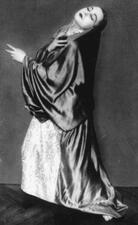
Tatjana Barbakoff
The daughter of a Chinese mother and a Russian Jewish father, Tatjana Barbakoff used her mixed heritage as inspiration for stunning and innovative dance performances. Her expressive technique entranced critics, while her costumes inspired dozens of painters and sculptors to capture her likeness. In 1944, she was killed in Auschwitz.
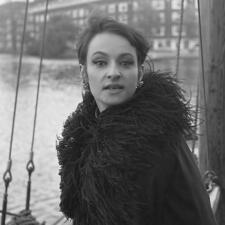
Barbara (Monique Andree Serf)
Barbara (Monique Andrée Serf) was a French singer and composer whose melancholy style rose to national significance. Born in Paris in 1930, after World War II Barbara studied music, rising to fame in the 1960s. Her Jewish identity and wartime experience as a child influenced her non-conformist persona as an artist, and through her song lyrics, she advocated for Franco-German reconciliation.
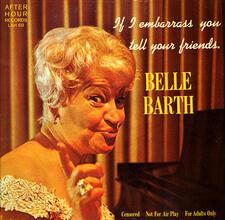
Belle Barth
Singing her way through popular standards and performing imitations of Sophie Tucker, Al Jolson, Harry Richman, and Gypsy Rose Lee kept Barth employed on the vaudeville circuit through the 1930s and 1940s. The character of her act changed in the 1950s, when she began to mix her two talents—music and comedy—and added a splash of “red hot mama” for good measure.
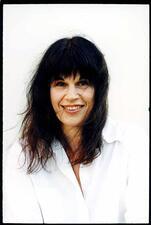
Michal Bat-Adam
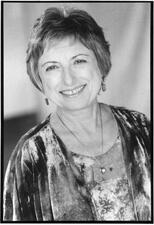
Ora Bat Chaim
Ora Bat Chaim is a poet, painter, and concert manager who in her late 50s began a prolific music composition career. Bat Chaim was the manager of the Zavit Theater and composed over 400 pieces for musicians, plays, and movie soundtracks. Her music can be described as a reflection of Jewish mysticism, yoga, and universal principles of truthfulness, compassion, and tolerance.
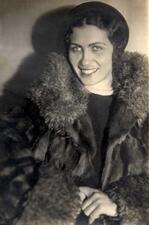
Shulamit Bat-Dori
Shulamit Bat-Dori defied notions about the inappropriateness of theater in the kibbutz, creating popular and acclaimed plays for the masses. Bat-Dori joined Ha-Shomer ha-Za’ir and made Aliyah in 1923, bringing her passion for theater, dance, music, and languages to Kibbutz B (later Mishmar ha-Emek). She wrote plays and founded the Kibbutz theater.
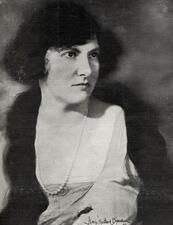
Marion Eugénie Bauer
Marion Eugenie Bauer was a modernist and experimental composer whose musical scholarship advocated for women’s voices to be heard and revived interest in female composers. As a teacher, writer, and composer, she was actively involved in many music and composition organizations, frequently as the only woman in a leadership position.
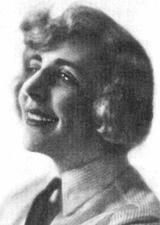
Vicki Baum
Writer, playwright, and screenwriter Vicki Baum is best known for her book, adapted into both the Broadway play and Oscar winning film, Grand Hotel. She wrote over 30 books and became one of the world’s best-selling authors of her time. Her works frequently depict powerful, self-reliant women.
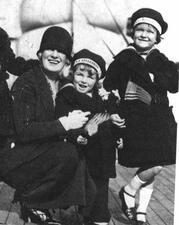
Nora Bayes
Nora Bayes was a star in vaudeville and musical comedy in the early twentieth century. Known for her lush singing voice and hilarious acting, Bayes was a part of the Ziegfeld Follies, the Keith vaudeville circuit, and had her own one-woman show. Bayes had many arguments with male producers, theater administrators, and businessmen, as she often questioned the traditional role of women and asserted her independence.

Ruth Behar
Award-winning cultural anthropologist Ruth Behar has conducted groundbreaking research in Spain, Mexico, and her native Cuba. Her innovations in cultural representation have transformed ethnographic writing and reached a broad, non-academic audience through her film, poetry, personal essays, and young adult fiction.

Jeanne Behrend
Jeanne Behrend was a renowned pianist, music educator, and composer who was dedicated to creating music and popularizing North and South American music. Behrend won Columbia University’s Joseph Bearns Prize in 1936; debuted at Carnegie Hall in 1937, performing one of her own compositions; and founded the Philadelphia Festival of Western Hemisphere Music in 1959.
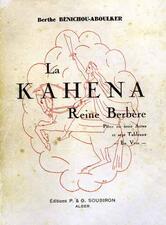
Berthe Bénichou-Aboulker
Writer and artist Berthe Bénichou-Aboulker was born in Oran, French Algeria, in 1886. She published a number of collections of poems and plays. After publishing her first play in 1933, she became the first woman writer to be published in Algeria.
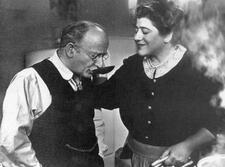
Gertrude Berg
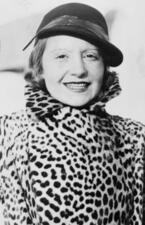
Elisabeth Bergner
Elisabeth Bergner, born in Austrian Galicia, was one of the most successful and popular stage and screen actresses in pre-World War II Germany, known for her superior artistic skills and wide variety of roles. During the war, she helped actors escape Germany. She was honored with the Schiller Prize of the City of Mannheim, the Ernst Lubitsch Prize, and the Austrian Cross of Merit for Science and Art.
Leah Bergstein
Leah Bergstein was the first of the choreographers in Palestine who, at the beginning of the 1930s, created festival dances at kibbutzim that depicted life in pre-state Israel and on agricultural settlements. The unique festival pageants she created, often with poet-composer Mattityahu Shelem, contributed to the development of rural Israeli festivals and holiday celebrations and the creation of the first Israeli dances.
Gail Berman
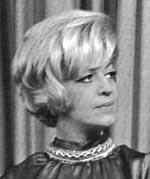
Yara Bernette
Raised in Brazil, world-renowned pianist Yara Bernette began studying piano with her uncle, a major Brazilian classical musician of his day. She toured across the world and became the head of the piano program at the Hamburg Music and Performing Arts School.
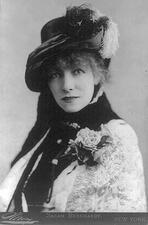
Sarah Bernhardt
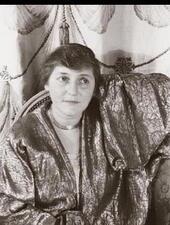
Aline Bernstein
Aline Bernstein was one of the first theatrical designers in New York to make sets and costumes entirely from scratch and craft moving sets. She designed sets for the Theatre Guild and various independent producers, winning numerous awards for her work, including a Tony for costume design for Regina in 1949. She later founded the Costume Museum and began writing fiction.

Amy Bernstein

Miriam Bernstein-Cohen
Miriam Bernstein-Cohen was an influential actor, director, poet, and translator in Europe and Israel. She was a versatile actor, appearing successfully both in comedies and in serious plays with the Ohel, Matateh, and Haifa Municipal Theater companies. In addition to her theater work, she wrote books and essays on theater and literature throughout her life.
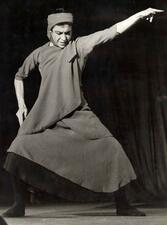
Deborah Bertonoff
From her debut at age nine through her performances in her late seventies and teaching into her late eighties, Deborah Bertonoff made dance her life’s work. Bertonoff began studying at the Bolshoi School before moving to Israel and joining the Habimah Theater. After studying dance in Europe she began choreographing, and in 1944 she founded a dance studio. She was honored with the 1991 Israel Prize.


